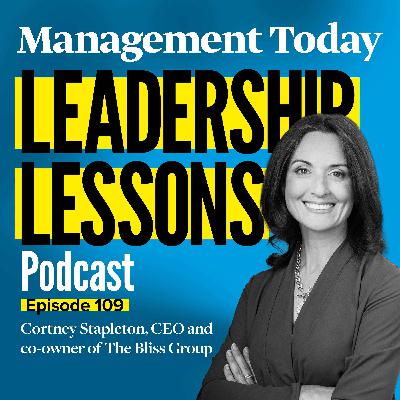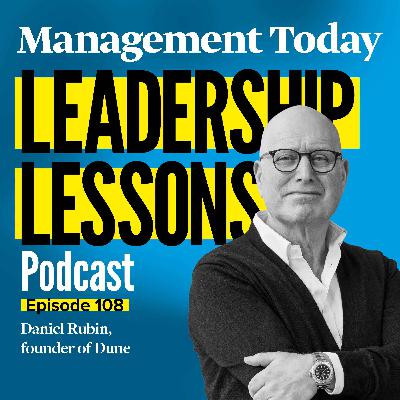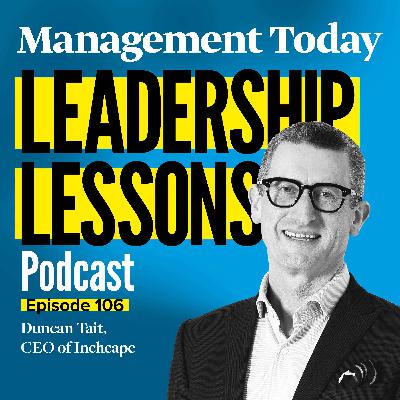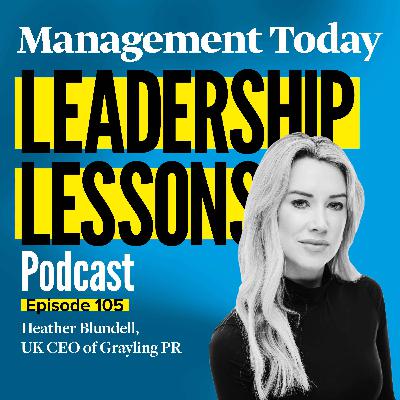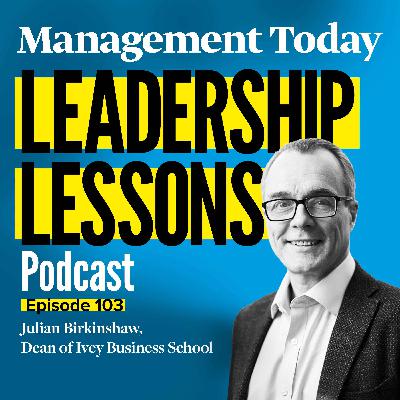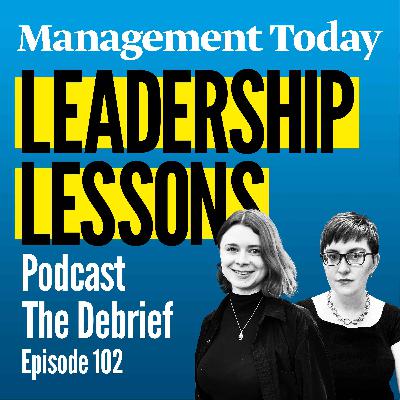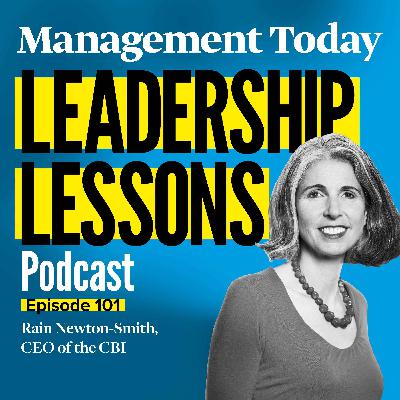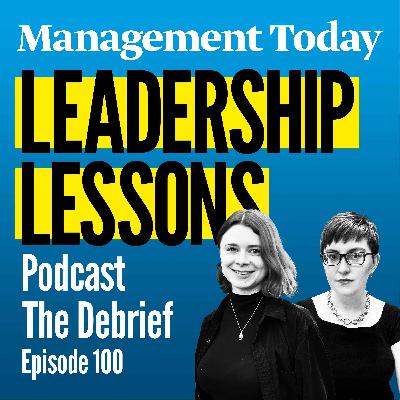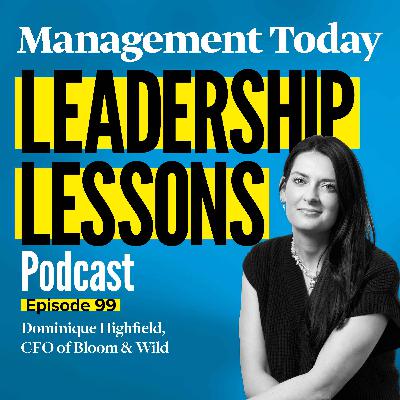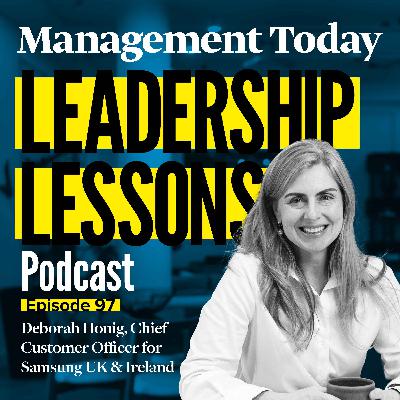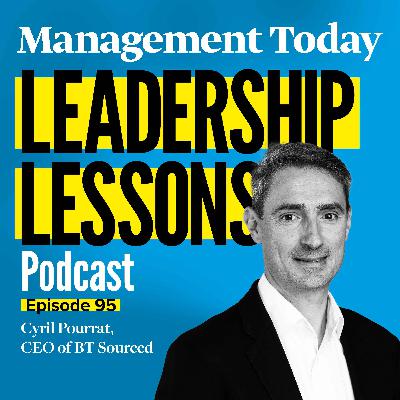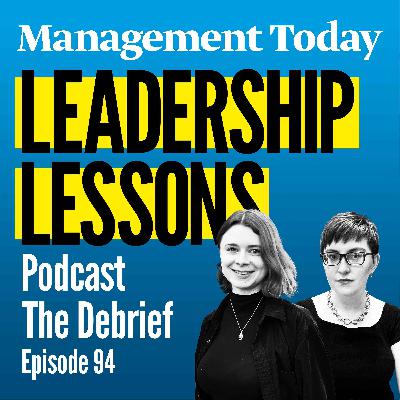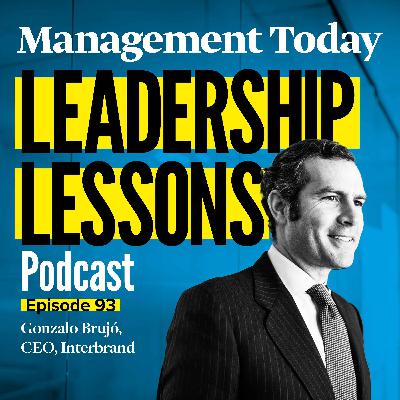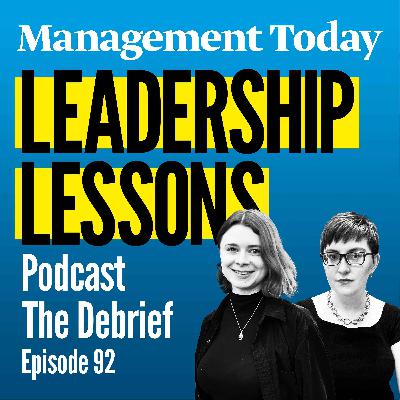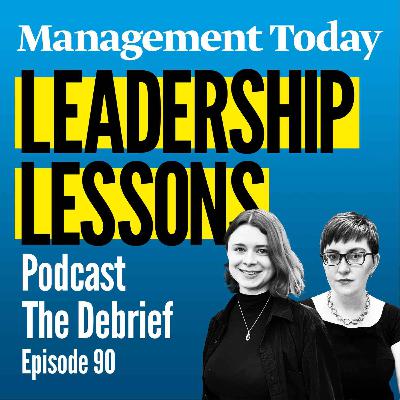Discover Management Today's Leadership Lessons
Management Today's Leadership Lessons

Management Today's Leadership Lessons
Author: Management Today
Subscribed: 48Played: 512Subscribe
Share
© Management Today
Description
Management Today's Leadership Lessons podcast is aimed at entertaining, educating and inspiring people to be better leaders.
The podcast delves into the world of leadership and management, bringing fresh insights, trends and advice to the ears of busy senior leaders.
We interview CEOs, founders, authors, executive coaches, business professors and other experts to discover the real secrets to effective leadership.
We also provide crucial insight into some of the biggest business stories of the day to help you stay ahead of the curve.
Hosted on Acast. See acast.com/privacy for more information.
110 Episodes
Reverse
Cortney Stapleton, CEO of the Bliss Group, outlines her journey from the non-profit sector to leading the 50-year-old marketing and comm firm, emphasizing a leadership philosophy grounded in intellectual curiosity where employees are given an opportunity to innovate and learn from failure. In this week's episode, she discusses the firm's proactive response to industry disruption, specifically their co-development of a custom, agentic AI tool designed to generate deep B2B insights while maintaining client security. She also covers her strategies for navigating a polarised media landscape and her role as a co-founder of Exponent Women, an organisation dedicated to empowering women in the deal-making profession.Credits:Presenter: Éilis CroninProducer: Inga MarsdenArtwork: Jenny Hardy
Hosted on Acast. See acast.com/privacy for more information.
Self confessed "shoe obsessive" Daniel Rubin launched fashion brand Dune London more than 30 years ago. Since then the brand has expanded from a shop on Oxford Street to locations across more than 130 countries.In this week's episode, Rubin discusses his new book - Sole Survivor: How I Built a Global Shoe Brand, which documents the brand's journey and the leadership lessons he learned along the way. He also dives into the challenges facing the modern day fashion industry.Credits:Presenter: Éilis CroninProducer: Inga MarsdenArtwork: Jenny Hardy
Hosted on Acast. See acast.com/privacy for more information.
Steph Edusei’s leadership strategy can be encapsulated in two philosophies: “be a little bit naughty” and “push the boundaries”. This mindset of challenging the status quo, paired with a commitment to compassionate, human-centred leadership, defines her career trajectory from the rigid NHS structure to the caring culture of the charitable hospice sector. Edusei spent almost 20 years in the NHS, where she experienced a culture of immense pressure, constant reorganisation and a sense of being a “small cog in a huge machine”. Her appointment in 2020 as CEO of St Oswald’s Hospice – a charitable hospice based in the north east – presented a stark contrast.Credits:Presenter: Éilis CroninProducer: Inga MarsdenArtwork: Jenny Hardy
Hosted on Acast. See acast.com/privacy for more information.
As the world grapples with an ongoing wave of global disruptions, which many have dubbed the “supply chain polycrisis”, automotive distributor Inchcape has been forced to adapt quickly. CEO Duncan Tait, who took the helm during the Covid pandemic, is putting his more than 30 years of tech experience to good use, steering the almost 180-year-old company through this turbulent period.On the latest episode of Leadership Lessons, Tait talks leveraging technology, understanding emerging markets, and driving long-term growth for Inchcape.Credits:Presenter: Éilis CroninProducer: Inga MarsdenArtwork: Jenny Hardy
Hosted on Acast. See acast.com/privacy for more information.
Visa, Birmingham City Football Club, and Grindr. What do these companies have in common? They're all clients of PR firm Grayling, headed up by CEO Heather Blundell, who will grace the stage as a speaker at this years' Women in Work Summit.In this week's episode, Blundell reflects on her career trajectory; from a rigorous start at Edelman, which she describes as SAS training, to taking on a managing director role at Weber Shandwick at age 29. Now leading Grayling, Blundell explains the strategic shifts she's driving, including the launch of Grayling Media, and discusses how the agency’s diverse client base serves as the perfect business case for why DEI is a business necessity, not just a 'tick box exercise'." Credits:Presenter: Éilis CroninProducer: Inga MarsdenArtwork: Jenny Hardy
Hosted on Acast. See acast.com/privacy for more information.
New ideas are the engine of corporate growth, but all too often established businesses find innovation too cumbersome and too distracting from the day job – which means it’s the preserve of nimbler start-ups.Daniel Aminetzah is a McKinsey consultant on a mission to change that. The global co-leader of McKinsey Business Building wants companies to pursue new revenue streams and act more like start-ups, even in deeply traditional industries. As he puts it: “We can allow ourselves to unleash our entrepreneurial muscle in many more contexts, including traditional corporates or professional firms. You don’t have to go to a garage and do it with another founder.”On the latest episode of MT’s Leadership Lessons podcast, Aminetzah explained how he helps firms upgrade their business building capacity. And despite the current macroeconomic uncertainty, he said many are ready to take the plunge.Credits:Presenter: Antonia Garrett PeelProducer: Inga MarsdenArtwork: Jenny Hardy
Hosted on Acast. See acast.com/privacy for more information.
American author F. Scott Fitzgerald famously wrote that: “The test of a first-rate intelligence is the ability to hold two opposed ideas in the mind at the same time, and still retain the ability to function.”This is also, according to dean of Ivey Business School Julian Birkinshaw and ex-Pearson CEO John Fallon, who have co-authored a new book on established companies in an age of digital change, a good definition of the mindset needed to navigate this kind of disruption. You can think of it, Birkinshaw told MT’s Leadership Lessons, as “being paranoid and pragmatic at the same time”.“So you have to have a certain level of paranoia that any new technology could be something that will make your life very difficult, that will be a threat. The pragmatic bit says, ‘we've lived through many, many rounds of digital changes…Most of our big organisations are still with us’.”To be more precise, as of 2020, only 35 of the Fortune 500 cohort from 1995 - when the internet revolution was really getting underway - had gone bankrupt. Today, its constituents that didn’t exist in 1995 number only 27.The prevailing narrative about established firms, Birkinshaw says, casts them as “relics of a bygone era” - dinosaurs pitted against the unicorns and other fleet-footed disruptors of the digital era. But this narrative, he and Fallon argue in Resurgent: How established organisations can fight back and thrive in an age of digital transformation, ignores many of the inherent strengths that have made these companies market leaders.For many organisations, haunted by the fear of falling victim to their own ‘Kodak moment’, the temptation when faced with a new technology might be to react quickly to counter the perceived threat. Not only, however, are the firms that fail to adapt to digital disruption “the absolute exception” that proves the general rule (namely that “big companies are way more resilient than people give them credit for”), but it’s important to recognise that people tend to overestimate the speed of change and executives therefore often have more time than they might think to work out whether, when and how much to invest in a new technology.Credits: Presenter: Antonia Garrett PeelProducer: Inga MarsdenArtwork: Jenny Hardy
Hosted on Acast. See acast.com/privacy for more information.
On this week’s episode, MT’s editorial team discusses the impact of AI on professional services and the role of psychological safety in business transformation.Is AI coming for your job? If you’re a consultant that question might have been hard to shake in recent months, after a slew of headlines warned of the impact on the profession and data showed that the Big 4 scaled back their entry-level hiring programmes last year – by as much as 33% in KPMG’s case (compared with 2023). It’s clear that AI is squeezing employment in professional services firms, London Business School professor Michael Jacobides wrote in a recent piece for MT. He suggests, however, that “the death of the firm is greatly exaggerated”. We consider his argument.Humans, famously, are uncomfortable with change - but transformation, by definition, requires us to disrupt what’s familiar. That tension is at the heart of many large-scale organisational change projects, and could be one reason why the success rate for such initiatives remains dismally low. In a recent piece for MT, Lesley Cooper outlines the role of company culture in driving innovation, engagement, and in helping employees to get comfortable with the unfamiliar. We discuss how leaders can create a psychologically safe environment.Credits: Presenters: Éilis Cronin and Antonia Garrett PeelProducer: Inga MarsdenArtwork: Jenny Hardy
Hosted on Acast. See acast.com/privacy for more information.
In 2023, the CBI became embroiled in a well-documented sexual misconduct crisis, which saw the exodus of a number of its member companies. Two years on, and with its former chief economist Rain Newton-Smith at the helm, the organisation is once again a trusted voice for businesses and is actively working with the UK government to boost business optimism and confidence.On this week's episode, Rain sat down with myself and MT's senior staff writer Antonia Garrett Peel to discuss what can be done to unlock business growth, how the government can support UK businesses in navigating new trade relationships, and her advice for stepping into a new and difficult role.Credits:Presenter: Antonia Garrett Peel and Éilis CroninProducer: Nav PalArtwork: Jenny Hardy
Hosted on Acast. See acast.com/privacy for more information.
In this week’s episode, we discuss how to elevate your business transformation abilities and the obstacles to women’s career progression in professional services.Ever heard of a ‘wicked problem’? Identified by two social scientists, Horst Rittel and Melvin Webber, in the 1970s, these are problems that are difficult or impossible to solve because of the numerous interlinked challenges they present, which are often in flux, may be contradictory, and involve multiple decision-makers. In a recent piece, MT columnist Chris Dalton argues that ‘wicked problems’ are one reason why business transformation is seldom straightforward. With the failure rate for such projects notoriously high, we bring you Dalton’s advice to support leaders in their organisational change endeavours. It may be 2025, but the number of women in M&A and professional services who feel their path to the C-suite has been hindered by sexist bias and discrimination is startlingly high (as many as one in three in the US). That’s the sobering picture revealed by a survey by CIL Management Consultants, which also cited imposter syndrome as a hindrance to career progression for women working in professional services. Éilis Cronin discusses her interview with CIL partner Tabitha Elwes, who offered her thoughts on how companies within the industry can support women as they climb the corporate ladder.Credits:Presenters: Antonia Garrett Peel and Éilis CroninProducer: Inga MarsdenArtwork: David RobinsonLinks:https://www.managementtoday.co.uk/five-personal-practices-art-business-transformation/mt-columnist/article/1927141https://www.managementtoday.co.uk/imposter-syndrome-lack-role-models-shape-womens-careers-professional-services/interviews/article/1926495
Hosted on Acast. See acast.com/privacy for more information.
Bloom & Wild's tagline is ‘care wildly’ - a message that could also be an apt description of the leadership ethos conveyed by CFO Dominique Highfield, who became the letterbox flower brand’s first finance chief when she was appointed in the autumn.In the two decades since she started out as an auditor at PwC, however, Highfield has also learnt that sometimes you have to “reframe kindness”.She draws an analogy between the difficult conversations you might occasionally have to have with an underperformer at work and the awkwardness when someone has something stuck in their teeth.“You could be loosely kind and not tell them and make it awkward - or you could tell them. It's that [idea of] radical candour…It might be slightly awkward at the time, but you've done it for their own best interest.”This week’s guest on Leadership Lessons, Highfield tells MT about how the company is driving top- and bottom-line growth through a combination of new categories, market expansion and technology. “We use AI in our customer contact team, we use it in our marketing…[for] creating scripts and…converting into different languages. I'm even using it in finance to help speed up our financial close so that my team can spend more time on value-added tasks.”The finance executive joined Bloom & Wild from online estate agents Purplebricks, where it quickly became clear that the task at hand was quite different from that on the job description. “Within the first 100 days I had issued a profit warning, put the business up for sale, found new owners and narrowly escaped administration.”While Bloom & Wild hasn’t required Highfield to summon the same reserves of resilience - the company’s positive growth trajectory was in fact part of what drew her to the role - she says that she is still learning in her latest position.The data-centric nature of the business, combined with the high level of financial literacy among employees, has meant that her traditional leadership style of “cheerleading, bringing everyone on the journey and giving them the story and…reasons why actually often isn't enough”. Instead, the unique company context also demands greater specificity and for ‘the story’ to be rooted in data points. “So I think being able to…understand the culture and then how your communication style and negotiation style or delivery style has to flex in light of that culture is really important.”Credits:Presenter: Antonia Garrett PeelProducer: Nav PalArtwork: Jenny Hardy
Hosted on Acast. See acast.com/privacy for more information.
On this week’s episode of The Debrief, MT’s editorial team discusses what can be done to boost business optimism and how groupthink can sabotage your transformation agenda.If the first quarter’s GDP figures briefly put a spring in Rachel Reeves’ step, this boost would have been short-lived, while we can only assume she had regained the standard-issue world-weary tread of a put-upon chancellor by the time the ONS’s latest monthly estimate rolled around. The 0.7% increase in GDP that raised spirits early in the year gave way to projections of virtually flat growth in the second quarter, while the most recent data for May showed a surprise – if small – contraction of 0.1% (let’s not even mention the latest inflation figures). But Downing Street aren’t the only ones feeling under siege. With sentiment among businesses faring scarcely better, we asked our community of CEOs what’s needed to boost optimism.It’s common to strive towards consensus, but at what point do organisations become echo chambers, where new ideas quickly lose steam under the collective weight of conformity - if they ever even see the light of day? And as businesses face the need to rapidly evolve to meet new realities, what implications does it have for transformations if teams are governed by common assumptions, shared notions of ‘best practice’ and attachment to what’s come before? Data Impact author Ritavan’s own view is clear: groupthink is the “silent killer of transformation”. We discuss his argument.Credits:Presenters: Antonia Garrett Peel and Éilis CroninProducer: Inga MarsdenArtwork: David RobinsonLinks: https://www.managementtoday.co.uk/mt-asks-against-backdrop-economic-headwinds-boost-business-optimism/opinion-and-analysis/article/1925050https://www.managementtoday.co.uk/groupthink-enemy-transformation/opinion-and-analysis/article/1924413
Hosted on Acast. See acast.com/privacy for more information.
Samsung is putting people at the very heart of its new company proposition. Under the direction of its first-ever chief customer officer, Deborah Honig, the company is evolving from creating standalone products to leveraging AI to give busy customers back time “in a world that reduces to slow down”.In this week's episode, Honig discusses Samsung's shift towards a "customer-first" strategy, focusing on integrating technology to provide meaningful solutions to everyday problems, such as reducing energy consumption. It's collaboration with British Gas directly supports customers looking to reduce their consumption and their energy bills.Credits:Producer: Inga MarsdenPresenter: Éilis CroninArtwork: David Robinson
Hosted on Acast. See acast.com/privacy for more information.
On this week’s episode, MT’s editorial team discusses what chatbots think of your brand and how humans and AI agents might work together in the future.The traditional customer journey largely consisted of touchpoints that businesses could control, such as website content or paid advertising. The rise of social media and proliferation of influencers has upended this – a challenge for brands that is amplified when these sources feed the chatbots that have become a consumer and business go-to for product and service recommendations. BCG’s chief marketing officer Jessica Apotheker recently spoke to MT about the evolution of reputation management in the gen AI era. We discuss what she had to say.Continuing the AI theme, in a recent article for MT, Salesforce UK&I’s CEO Zahra Bahrololoumi argued that today’s cohort of business leaders will be the last to oversee ‘all-human teams’. As the technology advances, she predicts that AI agents will become increasingly integrated into the workforce, taking on repetitive tasks so humans can focus on driving innovation. We unpack her argument.Links: https://www.managementtoday.co.uk/5-mins-with%E2%80%A6-jessica-apotheker/interviews/article/1922694https://www.managementtoday.co.uk/todays-ceos-will-last-manage-all-human-workforces-heres-why-thats-good-thing-growth/opinion-and-analysis/article/1923090Credits:Producer: Jude OwenPresenters: Éilis Cronin and Antonia Garrett PeelArtwork: David Robinson
Hosted on Acast. See acast.com/privacy for more information.
It’s 5pm on a Friday and you’re still in the office. In just two short hours, the CEO is scheduled to have dinner with a major supplier. This meeting is not merely a social occasion, but a strategic briefing. Preparations for events such as this are typically protracted processes, however you possess a unique advantage. By submitting a prompt to an AI program, you have effectively completed 90% of the work needed to prepare, thereby reducing the need for additional office hours and ensuring CEO satisfaction.This transformative approach, leveraging the expansive integration of AI across all departments, represents a shift in how BT Sourced manages its procurement operations. This isn’t purely about incremental improvements; it’s a fundamental reimagining of the entire large-scale procurement process.Cyril Pourrat, the company's CEO, discusses the inspiration behind this ambitious project, which cuts sourcing cycles from around a week to just one day and, in some cases, just a few minutes.Credits:Producer: Inga MarsdenPresenter: Éilis CroninArtwork: David Robinson
Hosted on Acast. See acast.com/privacy for more information.
On this week’s episode of The Debrief, MT’s editorial team discusses how to get employees behind your AI transformation and the six steps you need to nail when selling a business. When orchestrating a transformation it can be tempting to focus on the strategic, operational and financial dimensions of the change – the why, the what and the how – at the expense of the who. Objectives can be neatly mapped, and budgets and KPIs clearly delineated, while winning over employee sentiment presents a somewhat hazier and more slippery goal. But this task becomes even more important when standard-issue resistance to change meets ‘FOBO’ (fear of becoming obsolete) in the AI integration era. We consider Immediate Media people director David Reay’s pointers for getting it right.Selling a business, as Heligan partner Simon Heath recently wrote for MT, is often described as ‘part marathon, part chess game’ – and for good reason. Parting with something you’ve poured years into building can feel simultaneously like a test of endurance and strategy, but there are pointers you can follow to smooth the process. Heath has broken down a sale into six steps – we bring you his tips for nailing each one.Links: https://www.managementtoday.co.uk/avoid-one-error-wreck-ai-strategy/opinion-and-analysis/article/1920705https://www.managementtoday.co.uk/selling-business-six-steps-need-nail/down-to-business/article/1921941Credits:Presenters: Antonia Garrett Peel and Éilis CroninProducer: Inga MarsdenArtwork: David Robinson
Hosted on Acast. See acast.com/privacy for more information.
2025 has so far been a year of high profile M&A deals, But Trump’s trade war, armed conflicts in Eastern Europe and the Middle East, and, on a more local scale, the UK’s various trade agreements with the US, EU, and India, have all contributed to business leaders delaying investments, according to the latest EY-Parthenon CEO Outlook survey.Chief executives are always looking for ways to increase financial value for their customers, clients, and shareholders, says Gonzalo Brujo, chief executive of consultancy Interbrand. Their focus is always on “expanding, gaining different capabilities, bringing in different partners, gaining customers from around the world, and bringing new ideas to the table”. In his view, leaders must always have a pipeline of acquisitions or new mergers to ensure their company survives and thrives. In this week's episode, He provides CEOs with a checklist to help them elevate their brands throughout the M&A process.Credits:Producer: Inga MarsdenPresenter: Éilis CroninArtwork: David Robinson
Hosted on Acast. See acast.com/privacy for more information.
On this week’s episode, MT’s editorial team discusses the pros and cons of AI avatars and whether our consumption habits are hurting British business.Swiss-based bank UBS is using AI to create avatars of its experts that will appear in video content for clients, in a move it claims will be a win for productivity. The technology, while not a new phenomenon, raises significant questions about AI’s potential impact on human connection and relationships in business. We discuss the pros and cons of using digital clones.If the other outcomes of Trump’s manoeuvrings on US-China trade are still unclear, one thing he has achieved has been to thrust the issue of “de minimus” exemptions firmly into the spotlight. In April, the UK government announced it would be reviewing its own rule, which permits packages worth less than £135 to enter the country duty-free – a loophole that many credit with fuelling the rise of Chinese retailers such as Shein and Temu. As one Telegraph commentator wrote that UK homes have become “temporary staging posts for goods on their way to the landfill”, MT asked its readers: is the UK bingeing on cheap imports at the expense of British business? We bring you a flavour of the responses.Links:https://www.managementtoday.co.uk/ai-avatars-future-business-communication/long-reads/article/1920337https://www.managementtoday.co.uk/bingeing-cheap-imports-expense-british-business/opinion-and-analysis/article/1918842Credits:Presenters: Antonia Garrett Peel and Éilis CroninProducer: Inga MarsdenArtwork: David Robinson
Hosted on Acast. See acast.com/privacy for more information.
“Any idea you can think of for a new product, I guarantee you that somewhere in the world there’s six other people thinking of the same thing.”If those words from L.E.K. Consulting vice chair Stuart Jackson come as something of a reality check, consider also the challenges involved in achieving superior functionality to existing offerings, defining a market, and gaining those consumers’ trust. And that’s not to mention the incumbent channels, suppliers and even parts of your own organisation that will be “trying to find ways to preserve the current order of things”.It’s little wonder then that the failure rate for new products is so high. Fortunately, however, there are steps you can take, as Jackson and co-author Ilya Trakhtenberg write in their new book Predictable Winners, to “systematically identify and retire risk at each step of the innovation journey”.This week's guest on Leadership Lessons, Jackson offers listeners advice on doing just that. He also talks about the pitfalls of sticking to incremental innovation, the role of leadership mindset, and where to find the 'low-cost signals' that can offer clues as to what would-be customers really want.*This episode was recorded on 22nd April.Credits:Producer: Inga MarsdenPresenter: Antonia Garrett PeelArtwork: David Robinson
Hosted on Acast. See acast.com/privacy for more information.
On this week’s episode, MT’s editorial team discusses whether businesses are burying their heads in the sand when it comes to cybercrime and some common traps that risk undermining your international expansion efforts.It’s been a torrid time for Marks & Spencer as it continues to battle a cyberattack that according to one estimate is costing the retailer £43m a week. And it’s not the only one to fall victim. The Co-op has said it is now in the “recovery phase” after an attack forced it to take crucial systems offline, while the same group has also claimed responsibility for an attempted hack of high-end department store Harrods. Their plight is hardly unique, but are businesses facing up to the threat to their operations? We asked our audience.Expanding overseas can require leaders to revert to a “start-up mentality” – at least that’s the argument of Tipalti president Rob Israch, who authored our second piece for this week. We bring you his tips for avoiding common pitfalls of international expansion, including what leaders typically get wrong about localisation and how to ensure your product, service and culture resonate with local customers and employees.Links: https://www.managementtoday.co.uk/mt-asks-businesses-burying-heads-sand-cyber-crime/opinion-and-analysis/article/1916933https://www.managementtoday.co.uk/m-s-lessons-retailers-approach-crisis-communications/opinion-and-analysis/article/1917341https://www.managementtoday.co.uk/leaders-wrong-localisation/opinion-and-analysis/article/1916615Credits: Presenters: Antonia Garrett Peel and Éilis CroninProducer: Inga MarsdenArtwork: David Robinson
Hosted on Acast. See acast.com/privacy for more information.


